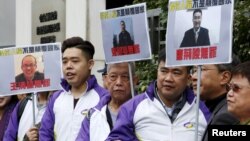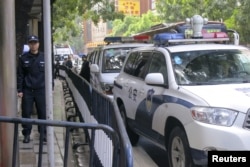A Guangzhou, China court Friday handed down guilty verdicts for three Chinese rights activists — Tang Jingling, Yuan Xinting and Wang Qingying — who now face up to five years in prison for “inciting subversion of state power.”
Human rights groups call the court’s decision “unjust,” arguing that the case has been marred by multiple procedural violations and reflected the Chinese government’s increasing hostility toward peaceful dissent.
They also expressed concern the sentences handed out in the closely-watched trial do not bode well for many more human rights lawyers in detention, some of whom may soon stand trial for similar “subversion” charges.
Chinese officials have not yet commented on the verdicts.
After a 20-month detention, the three men, known as “the three gentlemen of Guangzhou,” were convicted for promoting “non-violent civil disobedience” and peaceful transformation to democratic rule in China.
The Guangzhou Intermediate People’s Court sentenced Tang, Yuan and Wang to a jail-term of five, three-and-a-half and two-and-a-half years respectively.
Upon hearing the verdicts Friday morning, Tang's lawyer, Ge Yongxi said “Overall, the three of them were very calm. Their calmness comes from their disregard and ridicule on the unlawful verdicts."
Ge also said the trio had long come to the realization that their verdicts would be finalized by higher-ups in the Communist Party, which gives little autonomy to the courts in China.
But the lawyer argued the case has set the worst example possible, as many of its legal procedures, including its arrests, gathering of evidence and court trials, were seriously flawed.
Most importantly, no reform-minded activists of the country’s civil rights community should have had been put behind bars in the first place, Ge said.
“Tang Jingling advocates the idea of non-violent disobedience, which aims to build China as a free democracy," Ge said. "It poses no threat to the country at all, shall it become a free and democratic nation. Under such circumstances, how can the government arrest him?”
In addition to the disobedience movement in 2006, the trio also participated in press freedom protests in Guangzhou in 2013 and commemorative activities for the 25th anniversary of the Tiananmen massacre in 2014.
No appeal
Tang has decided not to appeal their case.
“If no justice can prevail in Chinese courts, it’ll be pointless to seek appeal," said Wang Yanfang, Tang’s wife. "Tang Jingling said that he would only appeal his case to the people and the lord.
"My husband hopes to push China towards democracy by the peaceful means of civil disobedience," she later told VOA's Mandarin Service. "I support his reasons not to appeal. But as his wife, I hope Chinese authority abide by the law and respect the law.”
Saddened by the verdict, Wang said that she still took pride in the courage of her husband, whom she called a man of integrity.
She also complained about the inhumane treatment the trio allegedly endured while in detention. One rights group cited a defense lawyer's claim that Wang Qingying was repeatedly beaten by fellow detainees and guards, forced to wear handcuffs and leg irons for 15 days, and subjected to forced labor each day.
Tang's other defense attorney, Yan Xin, said he respected his client's decision not to appeal.
"According to our understanding of the situation, even if he does appeal, the opportunity for a reduced sentence is only theoretical," he said. "Whether he appeals or not will not have a substantial impact on his sentencing. His decision not to appeal showed his decisive attitude toward the rulers of the system."
Subversion charge
What worries human rights groups even more is that Chinese authorities appear to have dramatically increased their use of “subversion” charges as a political tool to quash government critics, especially in the past year and a half.
In the past month alone, 11 rights lawyers and assistants have been arrested and charged with the more serious subversion charge, which carries up to a life sentence, said Frances Eve, a researcher with the rights group Chinese Human Rights Defenders.
“Chinese laws permit various loopholes under the umbrella of national security," Eve said. "It’s very serious that we’re seeing more cases of individuals being charged with this crime.”
As of Friday, at least 317 rights lawyers, assistants and their family members have been arrested, detained or put under house arrest, according to another Hong Kong-based rights group, China Human Rights Lawyer Concern Group.
Rights groups expressed concerns that, as some of those detained rights lawyers may stand trial soon, the trio’s sentences Friday may spell more bad news to come.
“It’s quite clear that the government is not backing down," Eve added. "It’s persistently persecuting human rights defenders. And it’s an omen and it’s bad sign.”
This article was produced in coordination with VOA's Mandarin service.










